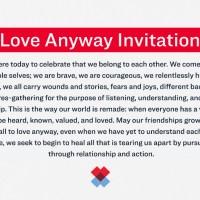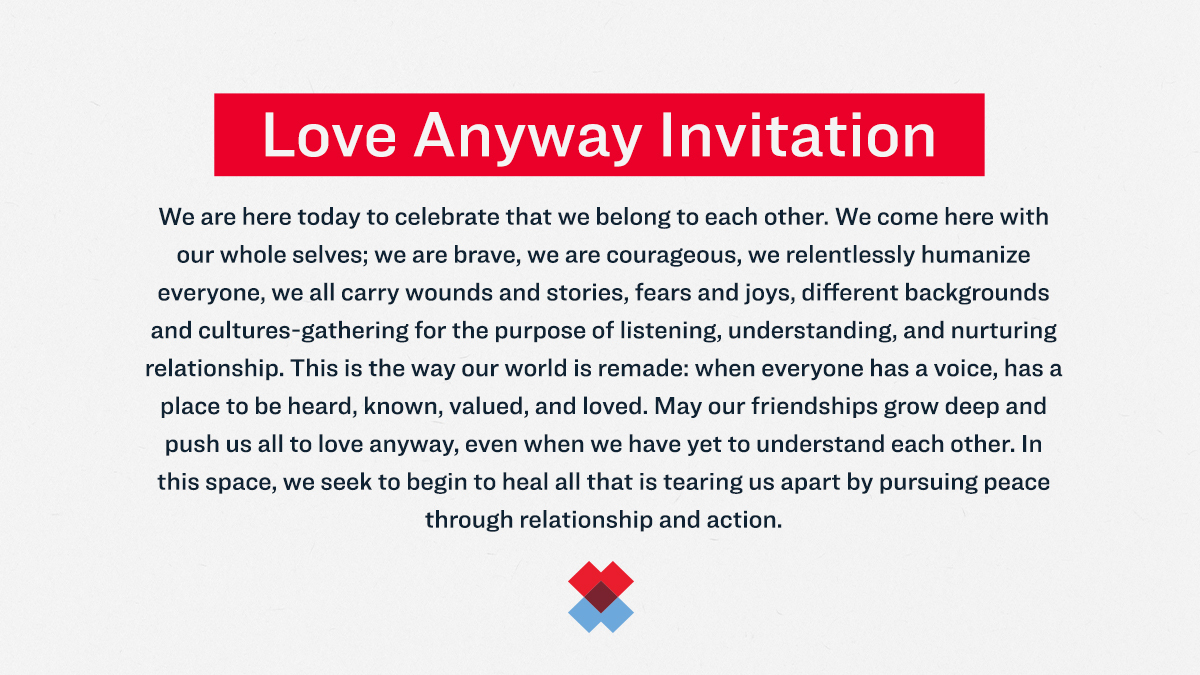What does it mean to love anyway? How do we live this value? In this heartfelt, unsent letter, Preemptive Love’s Saadia Qureshi shows us what living this value looks like against all odds.
Dear Neighbor,
I moved to this neighborhood when my daughter was in first grade. We were excited to begin her elementary education just up the road from where I was raised. My childhood was nice enough. I am the daughter of immigrants, and I grew up watching my parents navigate, with varying degrees of success, the stress of having a family in a country that was utterly foreign to them while working tirelessly to achieve the American dream. They provided a stable, comfortable home, but I experienced racism in my childhood.
I hoped that raising my family would be different.
I hoped that raising my family would be different. After all, I grew up here, in this central Floridian town. I was weaned on 80s pop music, wore Levi jeans, spooned down mac and cheese, and chased it with milkshakes. Unlike my parents, I spoke the local language accent-free and knew the system. I am a Muslim, Pakistani American. So when my little seven-year-old asked if she could have a playdate with your son, I was excited for this new chapter in my life: a PTA mom game for neighbor movie nights and ready for potlucks and picnics.
We had a nice time. You came over, and our kids traded their favorite Pokemon cards and giggled and screamed, playing hide and seek as we talked. You also shared with me how your husband had retired from the police force. You confided how challenging raising a family was while fearing for your husband’s safety. You were relieved when your husband left the force and took a job as an officer at a local university. I smiled inwardly when you told me where because I had gone to that university and hoped to send my children there one day too.
As a lifelong connector, I love getting to know people, listening to their stories, and understanding their perspective. I also like sharing my own. I saw this playdate as an invitation to begin a relationship with you and your family. The thought of becoming friends with someone different from myself in my neighborhood excited me.
I began with becoming your family’s Facebook friend. We shared recommendations for painters and handymen, complained about weeds and lawn care woes, and strategized over PTA fundraisers and car pick up lines. Each traded nugget of information connected me to the possibility of your friendship. Then, I noticed what you were posting on Facebook.
She responded, “I would never waste my time meeting a Muslim like you,” to which I replied, “but I’m nice!”
You shared about the challenges the police faced at the height of Trayvon Martin’s death, which happened only 15 minutes from our houses. You posted anti-immigration articles, reposted 9/11 rhetoric, and highlighted anti-Muslim videos about jihad. On every post, I replied with “Let’s talk about this.” Or, “Will you have tea, and we can discuss? I’d love to hear why you shared this.” Sometimes, I’d try a different tactic such as, “I just made great banana bread. Want to come over, and we can discuss how this (your post) might be misleading?” I was trying my best to be patient, walking the fine line between inviting you to a hopeful and meaningful conversation without being overly bearing.
Most of the time, you ignored me and my invitations. However, two replies are etched into my memory. The first was from one of your friends whom I had also invited. She responded, “I would never waste my time meeting a Muslim like you,” to which I replied, “but I’m nice!” The second response was when I had asked you to meet with my family. You replied, “Yeah, maybe next week.” I felt like I had won the lottery: All my attempts at being kind and inviting had come to fruition. I couldn’t wait for this door to open. My desire to spread peace was finally becoming an opportunity to tangibly work towards it.
A week later, you fully blocked me on Facebook. I was upset and angry, my ego understandably bruised. I knew that your actions showed who you are, not what I am. You fear me, and although I profess that “I am nice,” you fear what thoughts and beliefs I may challenge in you. I would probably challenge my own too, dear neighbor.
A part of me wants the challenge because I truly believe that you cannot hate up close. Another part of me wonders how you can hate me when you do not know me.
A part of me wants the challenge because I truly believe that you cannot hate up close. Another part of me wonders how you can hate me when you do not know me. A third part of me is fearful. You are part of the law enforcement brotherhood. You have vowed to “serve and protect.” How will you do so in an honorable way if you have so much distrust of and hate for someone like me? How will you serve someone you have no desire to understand? How do you protect neighbors like me? Students like me?
Since then, I have sent you a get well card upon hearing that you were sick. I often drive by your house, smile and wave even now, because despite everything, my desire is not to quit. One day when the time is right, I will stop and ask you again, “Will you have tea with me?”
With peace,
Saadia
If you’re interested in learning more about how to love anyway, join us for a free four-week workshop. Learn how to connect more deeply, lean into differences, and love anyway. Love AnywaySign up here.


